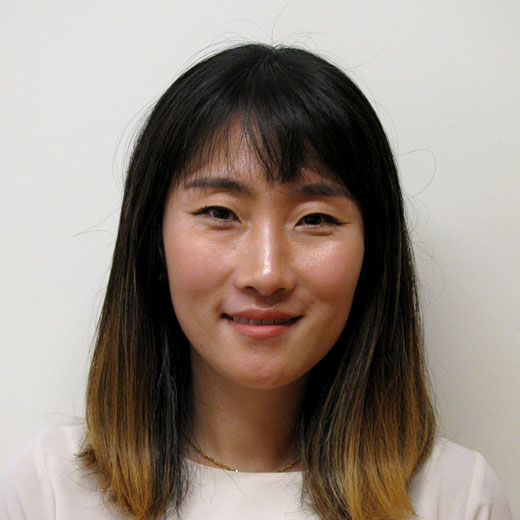
Related
Hyesun “Sunny” Jang is a staff scientist at the J. Craig Venter Institute, supervised by Dr. Marcelo Freire. With a background as a veterinarian, Dr. Jang is interested in developing host-directed anti-viral strategies against diverse zoonotic viruses.
Dr. Jang received her doctor of veterinary medicine (DVM) and master of science (MS) degrees from Chungbuk National University in South Korea (2005-2012). During the eight-year-training in Korea, Dr. Jang focused on developing novel strategies to diagnose and control avian diseases. In 2013, Dr. Jang moved to United States to pursue a PhD at Ohio State University (2013-2017) followed by postdoctoral training at the University of Georgia (2018-2021). During her PhD and postdoctoral training, Dr. Jang’s research interests led her to apply her knowledge of host-pathogen interactions to improve vaccines against zoonotic avian influenza viruses.
With her expertise in virology and veterinary medicine, she has been actively engaged in diverse projects to evaluate candidate prophylactics/therapeutics against the novel SARS-CoV-2 virus. Dr. Jang has also collaborated with pioneers in a wide range of fields, inspiring her to expand her research to include high-throughput analysis on biofluids. Dr. Jang joined JCVI to apply omics tools in the investigation of host-pathogen interactions. She believes that a better understanding of host-pathogen interaction will lead to the development of innovative prophylactic/therapeutic measures against rapidly evolving zoonotic viruses.
Research Priorities
Profiling salivary signature to COVID-19
- Screening antibody response and neutralizing activity of saliva to COVID-19 infection
- Comparative analysis on saliva samples collected from COVID-19 patients and healthy individual
- Identification of correlation among demography, immunologic/proteomic profiling and the elicitation of protective immune response
Verification of host-pathogen interaction
- Identification of dysbiosis in oral microbiota in diseases
- Understanding the role of oral microbiome in both systemic and local mucosal immune systems
Discovery of biomarkers in saliva samples
- Discovery of prophylactic/therapeutic/diagnostic targets in saliva against COVID-19 and type II diabetes mellitus (T2DB)
- Verification of critical biomarkers in biofluids associated with individual responsiveness to vaccinations
Publications
Frontiers in immunology. 2023-10-19; 14.1220610.
Oral mucosa immunity: ultimate strategy to stop spreading of pandemic viruses
Cell. 2021-04-01; 184.7: 1821-1835.e16.
Extremely potent human monoclonal antibodies from COVID-19 convalescent patients
Cell. 2021-04-01; 184.7: 1804-1820.e16.
Human neutralizing antibodies against SARS-CoV-2 require intact Fc effector functions for optimal therapeutic protection
PloS one. 2021-03-18; 16.3: e0246613.
Hemagglutination Inhibition (HAI) antibody landscapes after vaccination with H7Nx virus like particles
Poultry science. 2021-03-01; 100.3: 100893.
Prevalence, biosecurity factor, and antimicrobial susceptibility analysis of Salmonella species isolated from commercial duck farms in Korea
Veterinary microbiology. 2020-12-01; 251.108907.
Dried SARS-CoV-2 virus maintains infectivity to Vero E6 cells for up to 48 h
Human vaccines & immunotherapeutics. 2020-09-01; 16.9: 2042-2050.
Immune-engineered H7N9 influenza hemagglutinin improves protection against viral influenza virus challenge
Expert review of vaccines. 2019-10-11; 18.10: 1043-1051.
Preexisting influenza specific immunity and vaccine effectiveness
Journal of virology. 2019-02-01; 93.3:
Elicitation of Protective Antibodies against 20 Years of Future H3N2 Cocirculating Influenza Virus Variants in Ferrets Preimmune to Historical H3N2 Influenza Viruses
PloS one. 2018-04-06; 13.4: e0195285.
Efficacy and synergy of live-attenuated and inactivated influenza vaccines in young chickens
Research Priorities
Profiling salivary signature to COVID-19
- Screening antibody response and neutralizing activity of saliva to COVID-19 infection
- Comparative analysis on saliva samples collected from COVID-19 patients and healthy individual
- Identification of correlation among demography, immunologic/proteomic profiling and the elicitation of protective immune response
Verification of host-pathogen interaction
- Identification of dysbiosis in oral microbiota in diseases
- Understanding the role of oral microbiome in both systemic and local mucosal immune systems
Discovery of biomarkers in saliva samples
- Discovery of prophylactic/therapeutic/diagnostic targets in saliva against COVID-19 and type II diabetes mellitus (T2DB)
- Verification of critical biomarkers in biofluids associated with individual responsiveness to vaccinations